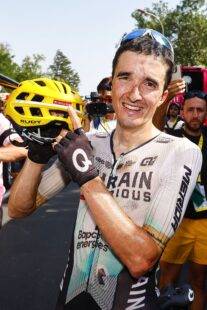Pello Bilbao shows a sticker on his helmet in honor of Gino Mader (Picture: Rex)
Do you want to know the beauty of the Tour de France? Because it isn’t the cycling, even as exceptionally dramatic as it has been this year.
It isn’t the mental escape of a vicarious road trip around some of the most beautiful corners of one of my favourite countries. It isn’t even the sight of grown men suspended from digger buckets by ropes, wobbling on hanging bikes for their three seconds of fleeting fame as captured by the cameras; though if you’re having a low day, it runs a close second.
No, the beauty of the Tour is the distillation of life itself, the novela-like narrative arcs played out in real time, it’s the compression of hope and desperation, of faith and despair, it’s the sealing of fates in the blink of an eye and the turn of a pedal stroke, reminding us of the arbitrary wave of fortune’s hand, for all its seeming inevitability. It’s the gut-scraping, lung-emptying battle through each and every day, that come to represent so much more than simply sport.
Yes, it’s only bike racing. But the Tour de France is life and death itself. Permit me to speak about Pello Bilbao and Gino Mader. If you saw the finish of stage ten as a casual viewer, you may have caught a flash of the significance of the win for the Spanish rider, Bilbao. Thirteen years a pro, this was his first Tour de France victory.
If you were only half watching while cooking the dinner or over a cacophony of kids and domestic life, as is often the case with me when watching from home, you may have briefly wondered at the layers of emotion folded into the winner’s face.
Perhaps, on seeing the podium presentation, his finger to the sky would have pointed to something more. The tremble of the bottom lip, even as he smiled. And if you were able to sit for a moment, you would have learned this wasn’t just a win for the intelligent, compassionate Pello Bilbao. It wasn’t even just a win for his team, Bahrain Victorious. It was a win for a wonderful, beautiful soul of a talent who was lost to the sport weeks before, at a race where Bilbao was a team-mate and friend – Gino Mader.
The death of Gino Maider devastated the cycling community (Picture: Rex)
It was a win for all of cycling, desperate for Mader’s name to fill the French air and for his memory to be brought to the fore on the greatest stage of them all. Mader was 26 years and 161 days old when he crashed on the side of a mountain in the Tour de Suisse in June. He was 26 years and 162 days old when he was pronounced dead, ripping the heart of the peloton in pieces.
Riders, teams, partners, parents, fans… we all mourned Gino, and what he represents to us all. This is only bike racing, but it is so much more. In a very different way, when Mark Cavendish crashed out of the race last weekend, two stages before Bilbao’s victory, his abandon was taken in the context of Gino’s death, but it was a genuine sadness to so many all the same.
Because Cavendish has come to represent so much more than his history-making 34 stage wins, as if that weren’t remarkable enough. His public career and very personal life journey have come to stand as much for resilience in the face of adversity, self-belief in a world of doubt, mental fortitude in a head full of pain.
Mark Cavendish crashed out of the Tour de France (Picture: AP)
His comeback from illness and depression in 2021 when he won four stages and the green jersey after five years of Tour drought, wasn’t simply redemption for a sprinter sidelined by two consecutive teams. It was a lesson to us all facing the inevitable darkness and disappointment of life, to just keep grinding on. A reminder that the good times are only as sweet because of the aftertaste of the bad.
Cavendish’s abandon, on what he said was his final Tour, dashed our own hopes, need even, for a fairytale ending. But only momentarily. Because cycling, like life, moves on. Nothing lasts forever. Neither pain nor glory. This too, shall pass.
As the race reaches the Alps today, in the most wonderfully dramatic edition of recent years, our attentions will be focused on the showdown between the two Tour de France riders of their time, Jonas Vingegaard and Tadej Pogacar. That race will be a thrill, it will have us on the edge and out of our seats. Weakness will be exploited, supremacy will be flexed and normal life will be escaped for whole afternoons at a time.
Jonas Vingegaard leads Tadej Pogacar in the general classification (Picture: AP)
But allow the race behind to be your teacher. Success doesn’t come easy for any of us. Modern living and social media can fool us otherwise, but for three weeks of the summer, we can see before our eyes the brutal heights and depths through which the human soul has to suffer for a slice of happiness. And we remember, we don’t always have to be the winner.
Making it through another day is success itself. How many of us have survived another turn of the sun with exactly that one, seemingly small but actually magnificent accomplishment to cling to? Yes, it’s only bike racing, but it is always so much more.
MORE : Daily Tour de France thrills are not traditional but we’re just getting started
MORE : Mark Cavendish may be retiring but British cycling’s golden generation is not done yet
The Tour de France offers us escape – and lessons in life.





